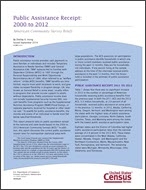Public Assistance Receipt: 2000 to 2012
Public Assistance Receipt: 2000 to 2012
Introduction
Public assistance income provides cash payments to poor families or individuals and includes Temporary Assistance to Needy Families (TANF) and General Assistance (GA). TANF replaced Aid to Families with Dependent Children (AFDC) in 1997 through the Personal Responsibility and Work Opportunity Reconciliation Act of 1996, often referred to as “welfare reform.” Unlike AFDC benefits, TANF benefits are time-limited, require most adult recipients to work, and give states increased flexibility in program design. GA, also known as General Relief in some areas, usually refers to programs that provide income support to adults without dependents. Public assistance income does not include Supplemental Security Income (SSI), noncash benefits from programs such as the Supplemental Nutrition Assistance Program (SNAP)/Food Stamps, or separate payments received for hospital or other medical care.1 To qualify for public assistance benefits, the income and assets of an individual or family must fall below specified thresholds.
This report presents data on public assistance receipt at the national and state levels based on the 2000 to 2012 American Community Surveys (ACS).2 In addition, this report discusses the current public assistance receipt rates for metropolitan statistical areas with large populations. The ACS questions on participation in public assistance identify households in which one or more current members received public assistance during the past 12 months. Data are for households, not individuals. If any person living at the sample address at the time of the interview received public assistance in the past 12 months, then the household is included in the estimate of public assistance participation.
__________
1 The Food Stamp Program was renamed the Supplemental Nutrition Assistance Program (SNAP) in 2008.
2 The data for 2000 were obtained from the Census 2000 Supplementary Survey (C2SS), which was the demonstration stage of the ACS. The C2SS was designed to provide accurate estimates for housing units and the population for the 50 states and the District of Columbia based on a sample of approximately 890,000 housing units. This sample did not include people in group quarters. In this report, the C2SS is referred to as the 2000 ACS. For more information on the accuracy of the data, see <www.census.gov/programs-surveys/acs/technical-documentation/code-lists.2012.html>.
Others in Series
Publication
Publication
Publication




